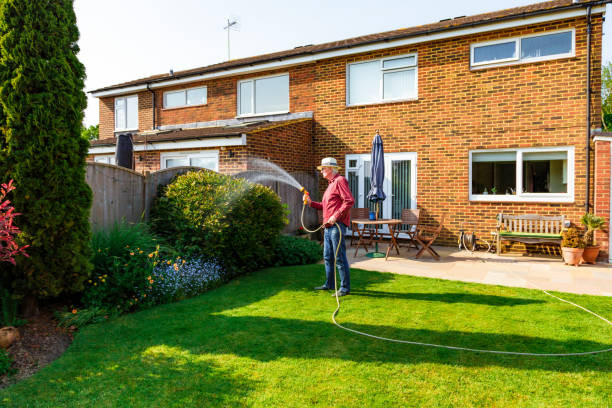How to Maintain a Healthy Lawn and Garden During Hot Months
Florence, United States - July 16, 2025 / ILD Innovative Landscape Design /
The summer season brings both beauty and challenges to outdoor spaces. Homeowners in Florence, SC, face issues such as stressed lawns, water shortages, and invasive weeds during these hot months. This article offers expert lawn care tips, efficient irrigation practices, and eco-friendly weed control methods, along with a comprehensive garden checklist, creative landscaping ideas, and sustainable outdoor strategies—all tailored to local climate needs and responsible landscaping practices.
What Are the Top Summer Lawn Care Tips for a Healthy Yard?
Summer lawn care begins with proper mowing and edge maintenance. Homeowners should mow frequently to remove heat-stressed grass tips and use an edge trimmer to create clean borders. Applying seasonal fertilizers at the right time boosts nutrient uptake and strengthens the lawn against drought stress and pests.
How Often Should You Mow and Edge Your Lawn in Summer?
Mow every 5–7 days and maintain crisp edges to prevent weed encroachment along sidewalks and driveways. A consistent cutting schedule promotes even growth and overall lawn health.
Which Fertilization Methods Boost Summer Lawn Health?
Use a balanced, slow-release fertilizer early in the season for vigorous growth and minimal burn risk. Supplement with liquid fertilizers for immediate nutrient boosts and organic composted manure to improve soil structure and microbial activity.
How Can You Improve Soil Health During Summer?
Improve soil moisture retention and nutrient availability by incorporating organic matter like compost or well-rotted manure. Seasonal aeration reduces compaction and supports a healthier root system, while regular soil tests help adjust nutrient requirements and pH levels.
What Are Effective Organic Weed Control Methods for Summer?
Combine hand weeding with mulching to suppress weeds and enrich the soil. Natural herbicides, such as vinegar-based solutions, and proper cultural practices like adjusting mowing height help limit weed germination. Regular monitoring ensures immediate control of invasive species.
How Do You Maintain a Garden During Summer: A Complete Checklist?
Successful summer gardening requires proactive practices to support both ornamental and edible landscapes despite high temperatures.
What Are the Best Pruning and Trimming Practices for Shrubs and Trees?
Regularly prune dead or diseased branches to encourage new growth and improve airflow. Early morning or late afternoon trimming reduces plant stress while shaping the landscape and minimizing pest habitats.
How Should Mulching Be Applied to Protect Plants in Summer?
Apply a 2–3 inch layer of organic mulch, such as shredded bark or straw, to conserve soil moisture, regulate temperature, reduce evaporation, and suppress weeds. Mulch also adds an attractive finish while slowly releasing nutrients.
When and How Should You Water Your Garden Efficiently?
Water in the early morning or late evening to reduce evaporation. Use drip irrigation or soaker hoses to deliver water directly to plant roots, and adjust watering frequency based on soil moisture levels and ambient heat.
How to Monitor and Manage Pest and Disease Risks in Summer?
Inspect foliage and soil regularly for pests and signs of fungal diseases. Use natural remedies like neem oil or insecticidal soap to control outbreaks. Proper spacing and garden hygiene also help reduce disease incidence.
What Are the Best Irrigation Tips for Summer Landscape Maintenance?
Efficient irrigation is essential during hot summer months. Smart watering practices conserve water and ensure sufficient moisture for lawns and gardens to endure drought conditions.
How Do You Check and Adjust Irrigation Systems for Summer Efficiency?
Inspect systems regularly for leaks and ensure proper coverage by adjusting sprinkler heads to avoid hardscapes. Set timers to water during optimal periods for the best efficiency and healthy growth.
What Are Water-Saving Irrigation Techniques for Hot Weather?
Employ drip irrigation and moisture sensors to deliver water precisely when needed. Smart controllers that adjust based on weather predictions help reduce wastage and lower water consumption.
When Is the Optimal Time to Water Your Lawn and Garden in Summer?
Water early in the morning or late in the evening when temperatures are cooler. This prevents rapid evaporation and ensures that water reaches plant roots effectively for healthier growth.
Which Summer Weed Control Methods Are Most Effective and Eco-Friendly?
Effective weed control is crucial for maintaining a pristine outdoor space without heavy reliance on chemical herbicides. Both natural and mechanical methods offer sustainable solutions.
How Can You Identify Common Summer Weeds Quickly?
Early detection is key. Familiarize yourself with common weeds like crabgrass and dandelions, and watch for irregular growth patterns and rapid spread along lawn margins for timely intervention.
What Organic and Chemical Options Are Available for Summer Weed Control?
Organic measures include using corn gluten meal as a pre-emergent herbicide and natural vinegar mixtures for spot treatment. Chemical options, if used, should be eco-friendly and applied following label instructions to avoid environmental contamination.
How Does Regular Lawn Maintenance Help Prevent Weed Growth?
Consistent mowing, proper fertilization, and aeration help create a dense turf that naturally suppresses weeds by reducing the light and space necessary for weed seeds to germinate.
What Are Creative Summer Landscaping Ideas to Enhance Your Outdoor Space?
Creative landscaping boosts curb appeal and enhances outdoor functionality, making summer spaces both attractive and sustainable.
How Can Seasonal Plants and Flowers Brighten Your Summer Landscape?
Integrate vibrant seasonal blooms such as petunias, marigolds, and impatiens to add color and life. These plants thrive in warm weather and attract pollinators essential for maintaining a balanced ecosystem.
What Sustainable Landscaping Practices Support Summer Maintenance?
Consider xeriscaping with drought-tolerant species, rainwater harvesting systems, and permeable hardscapes to improve water infiltration. These techniques reduce the need for supplemental irrigation and promote sustainability.
How to Incorporate Mulching and Ground Covers for Visual Appeal and Health?
Decorative mulch and low-growing ground covers like clover or creeping thyme unify the landscape visually while conserving moisture and preventing weed development. This approach also enriches soil health through organic matter degradation.
How Does Local Climate Influence Summer Landscape Maintenance Practices?
Local climate, including temperature fluctuations and humidity, greatly influences maintenance strategies. Tailoring care to regional weather patterns ensures that outdoor spaces remain vibrant and resilient during heat periods.
What Are the Specific Needs of Plants in Moderate Climate Zones?
In moderate climates, consistent watering, regular fertilization, and proper pruning help plants adapt to seasonal changes. Even with stable temperatures, adjustments may be necessary during unexpected heat waves or cool spells.
How Do Seasonal Weather Patterns Affect Lawn and Garden Care?
Weather patterns like early summer droughts or sudden storms require changes in watering schedules and pest management. Monitoring local forecasts helps homeowners adjust irrigation levels and prepare for weather-related challenges.
Why Is Personalized Landscape Maintenance Important for Summer Success?
Every landscape is unique. Tailored maintenance plans that consider soil type, plant species, and specific design elements lead to efficient resource use and sustainable long-term growth, optimizing both health and aesthetic appeal.
How Can You Create a Sustainable and Eco-Friendly Summer Landscape Maintenance Plan?
A sustainable maintenance plan integrates organic practices, efficient water usage, and eco-friendly materials to reduce ecological impact and enhance lawn and garden health over time.
What Are the Benefits of Using Organic Fertilizers and Weed Controls?
Organic fertilizers improve soil fertility by promoting beneficial microbes and reducing chemical residues. They offer gradual nutrient release, minimize adverse effects on non-target organisms, and foster a balanced ecosystem.
How Does Efficient Water Management Reduce Environmental Impact?
Techniques like drip irrigation and smart controllers help reduce runoff and conserve water. Optimized watering practices lower water costs and ensure that natural resources are used sustainably throughout the summer season.
What Role Do Professional Landscaping Services Play in Sustainable Summer Care?
Landscape professionals bring expertise in creating and maintaining eco-friendly outdoor spaces. Their knowledge of local climate and soil conditions results in maintenance plans that integrate sustainable practices and enhance overall aesthetic appeal and functionality.
Frequently Asked Questions
Q: How often should lawns be mowed in hot summer months?
A: Lawns should be mowed every 5–7 days to promote healthy growth and deter weed intrusion.
Q: What time of day is best for watering gardens in summer?
A: Watering in the early morning or late evening minimizes evaporation and ensures effective water absorption by plant roots.
Q: Do organic fertilizers really improve soil health?
A: Yes, they gradually release nutrients, boost microbial activity, and improve soil structure for healthier lawns and gardens.
Q: What is the primary benefit of drip irrigation systems?
A: Drip irrigation delivers water directly to plant roots with minimal wastage, enhancing water efficiency.
Q: How can professional landscaping services support sustainable maintenance?
A: They design customized plans based on local conditions that incorporate eco-friendly practices to maximize both aesthetic appeal and environmental sustainability.
Conclusion
Outdoor spaces need tailored care to thrive during challenging summer months. By using strategic mowing, efficient irrigation, and eco-friendly weed control, homeowners can maintain healthy lawns and gardens even in extreme heat. Embracing sustainable practices—from organic treatments to water-saving techniques—ensures long-term environmental benefits while enhancing curb appeal. For those in Florence, SC, a reliable summer landscape maintenance strategy will create a more resilient and inviting outdoor environment.

Contact Information:
ILD Innovative Landscape Design
2027 Rosedale St.
Florence, SC 29501
United States
Scott Brokaw
(843) 230-1036
http://www.ildsc.com/
Original Source: https://ildsc.com/media-room/


